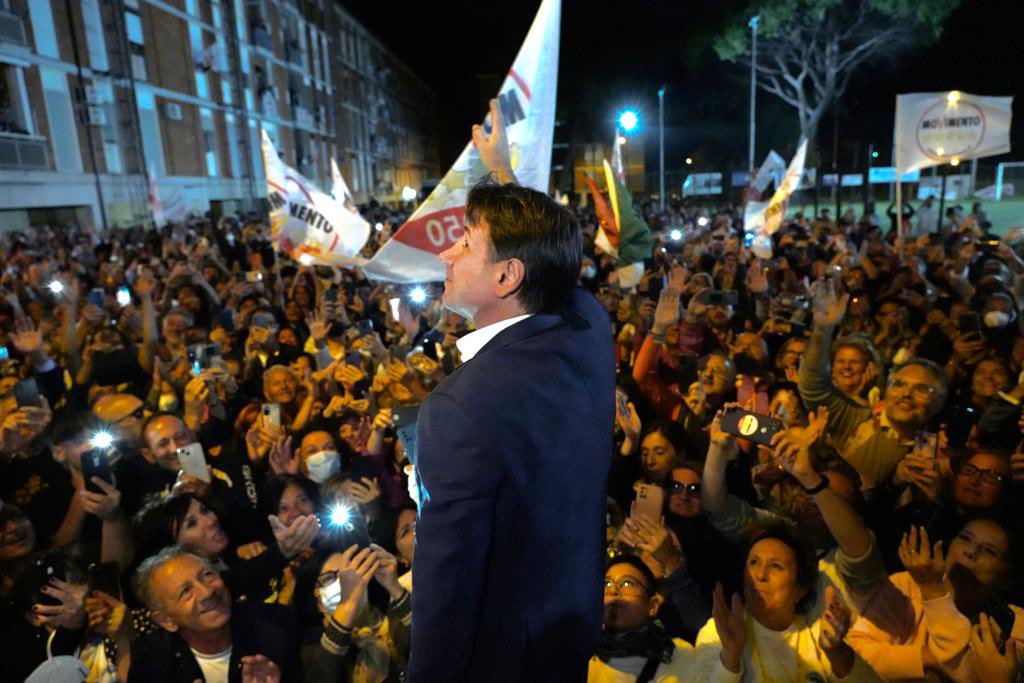In the run-up to Italy’s general elections on Sunday, much of the electoral coverage has focused on the far-right Brothers of Italy leading the polls. Yet one major issue could upset the right-wing coalition's all-but-certain victory: Citizen’s Income.
As a form of conditionally-guaranteed income, it has been pushed by the populist Five Star Movement as its flagship policy, and is very popular in Southern Italy – due to the many beneficiaries and its historically higher levels of poverty.
This may explain why, in the final days of campaigning, the major parties have headed south in an attempt to win over southern Italians. The region has several contested seats that may prove crucial in the final count, especially in the Senate.
To this end, Giorgia Meloni – leader of Brothers of Italy – decided at the last minute to wrap up her campaign in Naples, after going to Bari, Cagliari and Palermo. Similarly, Matteo Salvini and Silvio Berlusconi made rare appearances in Campania and Sicily.
After accusations that the south had been neglected, the right-wing coalition is trying to drum up last-minute support in the south, where it is weakest, and the Citizen’s Income could prove a stumbling block.
What is the Citizen’s Income?
The Citizen’s Income was a policy introduced by the populist Five Star Movement and the far-right Lega coalition government in 2018. It provides a conditional minimum income of €700 a month and was designed to tackle poverty both by supporting people and getting them into work.

Credit: Alex Mar / Creative Commons
As opposed to a universal basic income, only those who can prove that their total household income is below the poverty line qualify for the support. Recipients must also attend employment centres and take up a career path.
Has it worked?
Three million Italians benefit from the subsidy, 70% of which reside in Southern Italy – a testament to the inequality that affects the peninsula. The Italian statistical office ISAT estimates that the Citizen’s Income has lifted one million Italians out of poverty.
The issue remains pertinent as poverty rises after the pandemic and in the face of Europe's energy crisis. Many analysts believe that the policy, although imperfect, is an important protection from poverty.
As its biggest proponent, Giuseppe Conte’s Five Star Movement has positioned itself as the party of the South. The party currently sits fourth in polls; behind Brothers of Italy and the Democratic Party (PD) who are the respective frontrunners for the right and left-wing voting blocs. However, a resurgent Five Star Movement could hold an important electoral sway – having gone into coalition government with both Lega and PD since 2018's election victory.
An untouchable policy?
On Wednesday, Conte stated that the Five Star Movement “will not allow anyone to touch the Citizen’s Income” – a stand popular with southern voters. But the Citizen's Income has also divided opinions across the political spectrum.
Brothers of Italy and Giorgia Meloni have vowed to get rid of it, as has Salvini’s Lega (despite previously voting in favour when in government). Silvio Berlusconi has contradicted his coalition partners, arguing to keep the policy but “reform” it. Centrists Carlo Calenda and Matteo Renzi favour a referendum on whether to keep it or not.

Palermo, Italy. Credit: The Brussels Times / Ugo Realfonzo
In the centre-left coalition, the Citizen’s Income has been a sticking point. It is strongly associated with the opposition Five Star Movement, leading the PD to favour reforming policy rather than doing away with it altogether.
Is reform even possible?
All political parties (including the Five Star Movement) argue that, at the very least, certain aspects of the policy must be reformed. In particular, the Citizen's Income needs stronger protection against fraud and how it gets people into jobs could also be reviewed – as many argue that there are simply not enough jobs to satisfy the number of recipients.
While the policy has proved to divide opinions among political parties, the issue will now be decided at the hands of the electorate. Should the left coalition come to power, the Citizen's Income may survive – particularly as the PD is known for supporting basic welfare for people in need.
And with the Five Star Movement being outside any main coalition, the Citizen’s Income stands a better chance of surviving if a left-leaning coalition comes to power.
Could southern Italy be kingmaker?
For all the debate the policy provokes, many people rely on this income. According to an analysis by the Italian newspaper Corriere Della Sera, Citizen’s Income recipients account for 6.3% of Sicily's voters; in Campania, almost 7%. On a national scale, recipients make up 3% of the electorate. With a tough winter looming, these voters will likely make their voices heard.
Polls in southern Italy taken on 9 September point to Giuseppe Conte's Five Star Movement a strong leader with 24.5% of the vote. Enrico Letta's PD follows with 20.8%; Brothers of Italy took 17.7%; Berlusconi's Forza Italia 9.4%, and Salvini's Lega 8.4%.

Palermo, Italy. Credit: The Brussels Times / Ugo Realfonzo
Contested seats in the south (notably two in Sardinia, two in Puglia, and five in Campania) could be key battlegrounds for the election, and the future of the Citizen's Income.
Related News
- Russia ramps up interference in upcoming Italian elections
- Italy will hold elections on 25 September as far-right leads polls
- 'Widespread indifference': Nigerian man beaten to death in broad daylight in Italy
The last national poll – taken at the start of September – had Brothers of Italy at around 25%, followed by the PD at around 20%. PD heads the left electoral bloc without the Five Star, who are on 12%, neck and neck with Lega.
Conte has been assuring pundits that the Five Star Movement will do much better than expected. Were they to become electorally significant, they could fall in with both the right or the left, particularly after having been in coalition with both PD and Lega.
The PD is hoping the Five Star Movement can break up the consensus on the right. But a strong Five Star result could also take away votes from the centre-left.
While a right-wing coalition victory seems inevitable, the Citizen’s Income continues to split opinion and has brought the Five Star Movement back from electoral oblivion. Yet whether it will be enough to swing the nation away from the right remains to be seen in Sunday's election.

